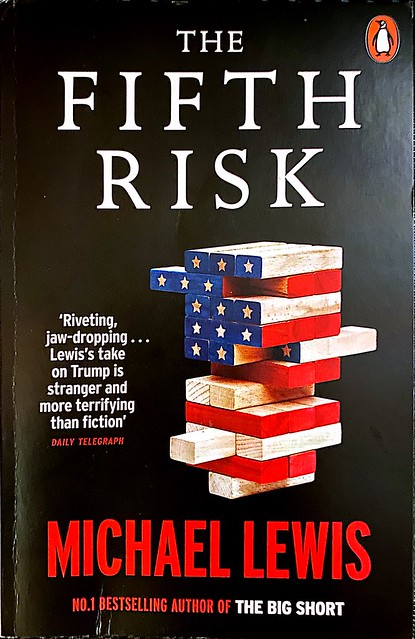3 minutes estimated reading time
Michael Lewis’ The Fifth Risk is marketed as a Trump presidency book.
The Donald
The Fifth Risk starts off by telling the story of Chris Christie. How he helped the future Trump administration organise a government in waiting. Christie and the team are let go. Trump was worried about spending money.
Given the revelations about Donald Trump’s finances in the New York Times; I can understand his desire to control cash flow. This goes some way to explaining the problems filling senior government places.
A second thing comes out in the first part of the book; Trump’s instinct to value personal loyalty. Which is fine; but doesn’t scale that well. That meant that people were often unsuitable for the jobs that they were given.
A final trait that came through was a massive root-and-branch concern against climate change.
So Lewis doesn’t say that much about the Trump administration that we didn’t already know. But that is only 30 percent of the book.
What the government does
The remaining 70 percent of the book tells the stories of different departments of the US government. The vital, complex roles that they play. He peels back the complex relationships between the federal government and the states. That interface builds in a lot of waste and inefficiency – to meet state political goals.
Lewis gets experts to explain how welfare payments work and why they’re needed. Or how departments like the National Oceanic and Atmospheric Administration and the Department of Energy benefit the country.
Lewis also covers what motivated some of the government service. TL;DR – from the new deal to the Kennedy administration young Americans felt that they could make a real difference. They felt inspired in a way that probably only clergy or military service personnel feel now.
Finally, touches on risks. The fifth risk that the Department of Energy expert talked about was programme management. This is where the name of the book comes from. How is programme management a risk?
- If a department is managed by someone who doesn’t understand the area involved.
- Realpolitik – NASA was for years a victim of pork barrel politics and the o-ring failure that happened on the Challenger disaster was a function of it
- If an administration takes a short terms, or small government world view.
In praise of Keynesian economics
The examples in the book tear away at the popular narrative around big government. Of inefficiencies and long queues of rapacious welfare queens.
It shows all the things that the government does for the collective good. Things that the market wouldn’t be able to address. It also shows the hucksters involved in the markets. In particular calling out Accuweather’s founders Barry and Joel Myers. That Lewis hasn’t been sued by Myers adds to the veracity of his claims.
This is essentially a criticism of the economic orthodoxy that has governed both of America’s political parties for the past 40 years, since the Carter administration. In this respect, the educated reader would appreciate that it fires a shot across the bow of all parties. From Sanders and Biden to Trump.
Style
I was introduced to Michael Lewis as a writer, when I read Liar’s Poker in college. It is a deeply personal book, full of humour and self examination. In it, he provides the ley reader an insight into the financial services system. Unfortunately, that didn’t seem to have much impact as the financial recessions following the dot com boom and the housing crisis proved.
He then wrote a slew of books that owe a good deal to the new journalism style of Tom Wolfe. His writing covered sports, financial crises and politics. Some of the books were very of their time, such as The Future Just Happened, Boomerang and Panic!. Others like Liars Poker, are ageless. A couple of his books were made into films of the same name: Moneyball and The Big Short.
The Fifth Risk still feels like the classic Michael Lewis new journalism style. But it also feels like it has an eye on a documentary adaptation. In this respect he reminds me a lot of Ben Mezrich in term of his cinematic approach to writing.
